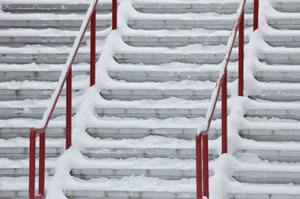Slip and Fall Injuries in New Jersey—What is the Duty of a Property Owner Regarding Snow and Ice?
 If you live in New Jersey, you expect that the area will be blanketed with snow at some point during the winter, and you know that ice storms and icy sidewalks can be a common hazard from October into April. But it begs the question—what are the duties of a landowner with regard to snow and ice?
If you live in New Jersey, you expect that the area will be blanketed with snow at some point during the winter, and you know that ice storms and icy sidewalks can be a common hazard from October into April. But it begs the question—what are the duties of a landowner with regard to snow and ice?
Under the common law of New Jersey, the owner of residential or commercial property has a duty to maintain the premises so as to minimize the risk of injury to anyone legally on the property. This requires the property owner to act as a reasonable person would—to reasonably monitor the premises for potential injury risks, and to take reasonable measures to either remedy the situation or warn visitors of the potential risks? What does this require a property owner to do with respect to snow and ice?
Interestingly, the rules are somewhat different depending on whether the property is residential property (essentially single-family dwellings) or commercial property—multiple dwellings are generally viewed as commercial property for purposes of liability for snow and ice removal. With a single-family, private residence, there is generally no duty to remove snow/ice or to warn others of the potential for accumulation or injury due to ice/snow, as people using the property are typically not what is known as “business invitees.”
A business invitee is a person who is on property for commercial purposes, who has essentially been “invited” to the property by the property owner to potentially engage in a business transaction. Because the owner or operator of business/commercial property is considered to have encouraged or enticed the business invitee to come onto the property, the duty to keep the business invitee free from injury is higher. Accordingly, properties that house commercial enterprises, including apartment complexes, require the owner or manager to take reasonable steps to monitor and remediate potentially dangerous situations. To recover for injuries, a person must show that the commercial property owner either knew or should have known of the likelihood of injury.
As a general rule, courts have held that the accumulation of snow is reasonably foreseeable in New Jersey, as is the likelihood of melting snow refreezing overnight. Accordingly, a commercial property owner must take reasonable steps to prevent the accumulation of snow and/or ice, or will be liable for any injuries that result. In addition, when a property owner has a duty to remove snow or ice, the property owner must exercise reasonable care when doing so. This means taking action that is reasonable both as to timeliness and effectiveness.
Contact Taylor & Boguski
At Taylor & Boguski, we have more than 70 years of combined experience representing injured people across New Jersey. For a free initial consultation, send us an e-mail or call us at 856-234-2233.

